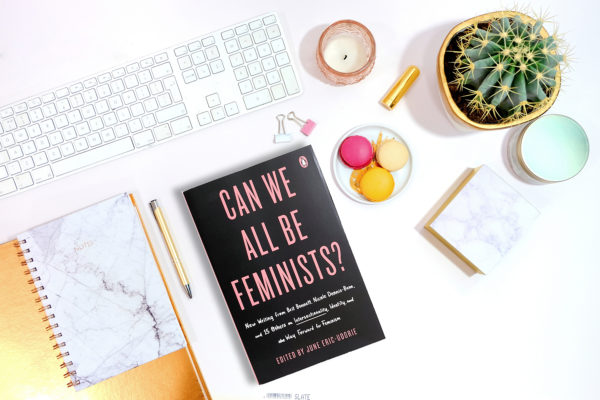
Wisdom Born of Pain
An anthology of essays forming a fascinating mosaic of viewpoints, insights, and understandings—Can We All Be Feminists? is a must-read for anyone looking to change their views via empathy and intersectional feminism.
“Intersectional feminism” is a term that represents the intersections of oppression—how non-white women, LGBT+ women, etc., experience oppression that is different from the narrative that white women regularly reiterate as universal. One of the key points the book makes is that “mainstream” feminism is often exclusionary; the movement has been greatly appropriated by upper- and middle-class white cis women who use a one-size-fits-all mindset and has repeatedly left women who do not fit in that category sidelined and/or excluded. But rather than using that as an excuse to reject the tenets of feminism entirely, the book’s first essay stresses the importance of building bridges to help strengthen the framework and ideological components of feminism. In each essay, a new theme is brought to the table with each writer’s experience and account: body image/policing, cissexism, cultural/nationality clashes, and much more. Complications, nuances, intersections are all fully discussed and elaborated on, with these individual perspectives forming a greater picture as a whole.
This book clearly shows that there is no “one true perspective” on what oppression, misogyny, and femininity mean and what The Female Experience is, but there are histories and experiences missing from the mainstream narrative—white women often stealing the spotlight of feminism in published memoirs and popular perceptions, causing tone policing and marginalization—that need to be included and understood to help make people, individually and collectively, better people. For more examples of this, I recommend White Tears/Brown Scars: How White Feminism Betrays Women of Color by Ruby Hamad.
The ability to reach out to people through open awareness, discussion, and multiple narratives provides opportunities for education and representation that can appeal to everyone. And there’s no better book to help open eyes and opportunities than Can We All Be Feminists?
Sisterhood Whitewashed
A brief terminology explanation, for the unfamiliar: “White feminist” does not mean someone who is white and also happens to be a feminist; it means someone whose definition of feminism, which they claim to support, revolves specifically around white womanhood and experiences. “Supporters of white feminism want to reconcile their feminism with the mythology that they are still special, better, ‘work harder,’ and are therefore entitled to the roles that any combination of race, class privilege, conventional femininity, and/or a cis gender have landed them.” This is one of the ways that Koa Beck’s book, White Feminism: From the suffragettes to influencers and who they leave behind, defines this toxic concept that infringes and holds back the principles of a movement that should truly advocate for all women.
The book manages to give a thorough definition and detailed account of white feminism. Its history—from early suffragettes to the reoccurring idea of “not being divided” (only when fighting against sexism, not racism) to how often second-wave concepts of “self-empowerment” lead to being “self-absorbed” —is covered in detail, showing its impact. The book also covers the prospects of how change and a new, better era—the Women’s March, among other crusades—can lead to a gradual awakening and growing unity in the truest and best sense.
The pillars of change that must occur include (among others): fighting for visibility, fighting oppressive systems, and holding (all) people accountable. Centering and prioritizing white narratives is not automatically feminist because the speakers are women; inevitably, it denies, drowns out, and seeks to silence other stories that need telling. Tied to recent events, a new wave of books on the theme of “anti-racism” has emerged that has provided new opportunities for women of color to write their truths—but that is not where the story ends. If published materials allow people, all people, to recognize their own truths, regardless of the form, through self-realization or representation of experiences, and marginalization has been consciously addressed, the potential consumer base will have widened to a larger audience.
White Feminism: From the suffragettes to influencers and who they leave behind is a terrific book to absorb and educate with, and it wonderfully helps guide readers into a new and better mindset. Interested in reading more book reviews? Check regularly on our blog or Instagram for more great book recommendations!




